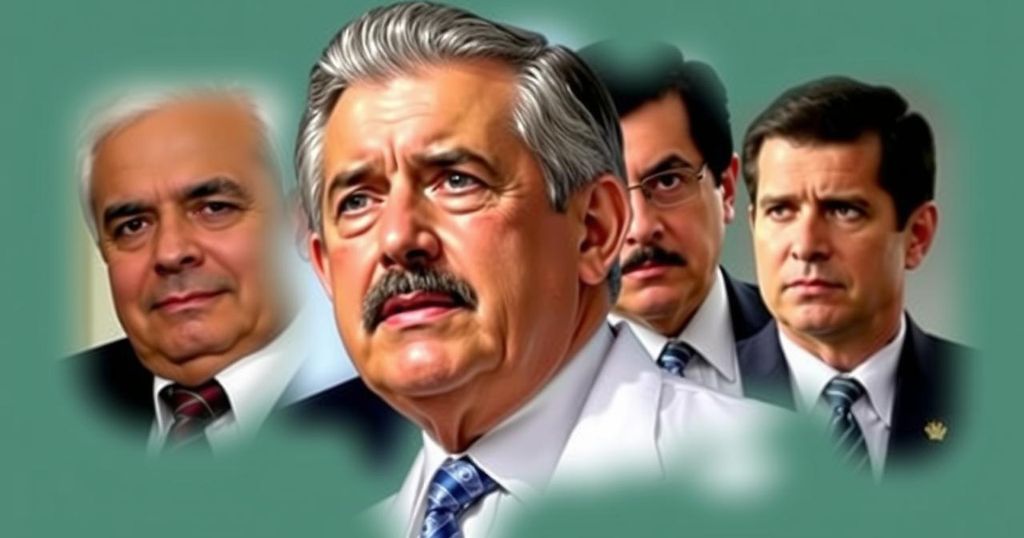Venezuela Issues Wanted Posters for Former Mexican Presidents Amid Political Crisis

Venezuela’s National Assembly has declared former Mexican presidents Vicente Fox and Felipe Calderón as persona non grata amid a political crisis following disputed 2024 elections. The Assembly’s action extends to seven other Latin American leaders who supported the opposition. Interior Minister Diosdado Cabello escalated tensions by issuing wanted posters accusing them of conspiracy, marking a significant diplomatic clash within the region.
In a significant escalation of diplomatic tensions, Venezuela’s National Assembly has officially labeled former Mexican presidents Vicente Fox and Felipe Calderón as ‘personae non gratae.’ This decision comes amidst disputes over the legitimacy of the 2024 electoral results, which incumbent Nicolás Maduro’s government claims to have won, contrary to opposition leader Edmundo González Urrutia’s assertion of victory. The Assembly’s action also applies to seven other former Latin American presidents, who had previously expressed support for González’s candidacy. As a deterrent, Minister of the Interior Diosdado Cabello has ordered the distribution of wanted posters featuring these leaders, accusing them of threatening Venezuela’s peace. This situation highlights the deepening political crisis in the nation and its broader implications for Latin America.
The political climate in Venezuela has reached a boiling point, exacerbated by the controversial 2024 election results where Nicolás Maduro was sworn in for a third term despite claims from opposition leader Edmundo González of a significant victory. Many Latin American leaders and international observers have contested the electoral integrity, indicating a fracture in regional alignment. Venezuela’s ruling party has thus responded by denouncing foreign leadership interference with a firm declaration to prosecute former presidents pursuing visits to Venezuela, marking a sharp diplomatic schism with Mexico and other nations that favor González’s stance.
The tension stems from diverse opinions regarding the elections, with many countries, including the United States, recognizing González as the true victor, as reports assert he won by a substantial margin. In contrast, Maduro enjoys support from several nations, including Russia and China. As political unrest lingers, this situation presents a profound geopolitical rift, demanding attention to human rights and electoral fairness in Venezuela. The responses from regional leaders underscore the complex political landscape in Latin America, where competing interests and differing political ideologies coexist.
“A representative will attend the inauguration, and we see no reason why this should be an issue.” – Mexican President Claudia Sheinbaum.
No links were explicitly mentioned in the original article.
In conclusion, Venezuela’s recent actions against former presidents Fox and Calderón reflect a broader struggle over political legitimacy and sovereignty in the country. The continued support for González from various international entities highlights the divide between allegations of electoral fraud and the government’s stance. As tensions escalate, regional dialogues surrounding independence, democracy, and human rights remain critical for future developments in Venezuelan and Latin American politics.
The political standoff in Venezuela centers around the disputed 2024 presidential election, where incumbent Nicolás Maduro claims victory against opposition leader Edmundo González Urrutia. The controversy has not only increased domestic tensions but has also drawn international scrutiny, leading to declarations and condemnations from various Latin American leaders and organizations. Venezuela’s current government has hardened its position against former leaders who support the opposition, further complicating diplomatic relations across the region. The labeling of prominent politicians as unwelcome signifies the extent of Venezuela’s internal crisis and its impacts on broader geopolitical dynamics.
The ongoing political crisis in Venezuela, underscored by the recent declaration against former Mexican presidents, illustrates the complexities of governance and diplomacy in a deeply polarized environment. This situation emphasizes the need for a multifaceted approach toward resolving issues of electoral legitimacy and international relations in Latin America. As the crisis evolves, the calls for independent verification of election results could play a decisive role in shaping Venezuela’s future and its relations with neighboring countries.
Original Source: mexiconewsdaily.com







